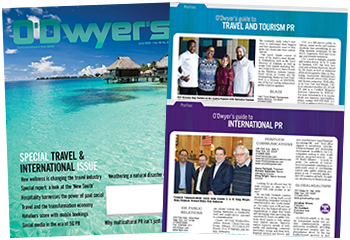 Lisa Ross |
Switching between devices used to be commonplace. Travelers would often begin their journey on mobile but would switch to desktop or laptop to go through the customer journey and book travel. This shift is expected to grow exponentially going forward: A study conducted by TrekkSoft found that 82 percent of bookings were made through a tour or activity operator’s own website, and of those bookings, almost half were made on mobile, gaining from 31 percent in 2016 and 49 percent in 2017, showing significant growth.
Additionally, new research from Google has found that almost the entire booking transaction now takes place on mobile. Google found that of all the digital interactions in which people engaged in researching and booking a trip, 87 percent of these moments happened on mobile.
|
|
The increasing shift towards mobile means there’s a new opportunity for hoteliers to engage with travelers in interesting and personalized ways pre-, during and post-trip, with the goal of creating emotional consumer connections that foster brand loyalty. With this in mind, here are three key strategies for mobile marketing that all hoteliers should know to maximize mobile booking and the customer journey.
Make sure your website is optimized for mobile to ensure positive user experience. Having a flashy, impressive website is not enough anymore. Hospitality companies must make sure to enhance the mobile user experience and optimize their mobile sites since that’s where the majority of the customer journey is now taking place. Hoteliers should ensure they’re emphasizing the most relevant and engaging parts of their sites on the mobile version.
A large part of this involves tailoring your website content to ensure it’s optimized for mobile viewing and browsing. For example, companies should emphasize quality visuals and eliminate heavy text because it won’t appeal to mobile users. Any video content that lives on your site should be relevant, informative and optimized for mobile.
Another part of this equation is strengthening your local SEO so that your hotel shows on mobile search, as well as optimizing your website for key mobile search terms. It’s now estimated that hotel mobile search queries are up 49 percent year over year, so it’s crucial to ensure that your hotel has strong local SEO to capture eyeballs. Marketers should also consider the importance of voice search and its growing influence on SEO and optimize their websites to follow a conversational tone and longer keywords that tend to characterize voice searches.
Strategic digital planning is necessary for staying in front of consumers. With so much information coming through users’ mobile devices on a regular basis, it’s crucial hoteliers tailor their digital strategies to cut through this clutter and capture the target audience’s attention. Social media is also important because it gives brands an opportunity to develop relationships and connect with customers when they’re not traveling. The most successful digital marketing campaigns integrate both paid and organic strategies to engage consumers and strategically stay with them throughout their online travel journey.
When it comes to paid digital media, hoteliers should invest in strategies that leverage both search and social content. Effective local search ads on mobile can capture last-minute travel buys. With consumers now constantly connected via mobile, they are more flexible and likely to make last-minute booking decisions when traveling, which presents a huge opportunity for marketers to invest in mobile advertising to appear prominently in search results. Hospitality companies should also consider paid social buys to reach relevant targets with content that aligns with their brands’ messages and goals.
An organic social media strategy is also key to capturing consumers’ attention, and marketers should ensure that their social media platforms are robust, engaging, and well-thought out to capture a traveler’s attention when they are in the mood to be inspired. Sharing images, experiences and smart travel content is necessary for staying in front of consumers.

Hilton All Suites’ Bring It! campaign is an example of a properly optimized mobile site, using mobile-friendly images, layouts and video content. |
Create key partnerships with like-minded brands. Strategic partnerships are an efficient way to establish new consumer relationships and enhance brand loyalty among existing guests. By partnering with other like-minded brands that are engaging with the same consumer, creating an emotional connection and sharing information becomes easier and in the end results in an experience that customers become more invested in. Brands can utilize the demographic information of its guests to determine which brands are the most appropriate for a strategic partnership, and then agree on how to integrate the activity via content creation, promotions, visuals, etc. into their overall marketing strategy.
For example, Embassy Suites by Hilton’s Bring It! campaign strategically engages social influencers to get in front of specific different target audiences with a common overarching theme, taking advantage of space for families, extra stuff or just stretching out. Engaging with these different influencers to reach their networks involves using smart visual content that pairs travel opportunities with the brand’s spacious suites. The key is using appealing images more than text to optimize the mobile experience. This not only earns consumer interest and trust but encourages them to browse on mobile and ultimately drive mobile bookings.
Now that the mobile journey is the main journey, travel brands are beginning to better understand user behavior and adapt their marketing strategies to align with travelers’ mobile habits. By ensuring that marketers adhere to these three guidelines, travel campaigns will be more effective, engaging and successfully resonate with consumers in the digital marketplace.
***
Lisa Ross is president and co-founder of rbb Communications.



 Weber Shandwick is providing PR and marketing communications services to the Moroccan National Tourist Office in New York.
Weber Shandwick is providing PR and marketing communications services to the Moroccan National Tourist Office in New York. Finn Partners has filed its six-month contract with the Bahamas Ministry of Tourism, Investments & Aviation, which is worth $240K.
Finn Partners has filed its six-month contract with the Bahamas Ministry of Tourism, Investments & Aviation, which is worth $240K. Weber Shandwick wrapped up its work for the Ministry of Bahamas at the end of 2023.
Weber Shandwick wrapped up its work for the Ministry of Bahamas at the end of 2023. The Aruba Tourism Authority is boosting its budget 29.4 percent to $2.2M at Zeno Group, according to its 2024 contract, effective Jan. 1.
The Aruba Tourism Authority is boosting its budget 29.4 percent to $2.2M at Zeno Group, according to its 2024 contract, effective Jan. 1. As inflation continues to impact spending, consumers are revisiting their list of what they’re willing to spend more of their money on. Luckily for those in the travel industry, experiences seem to be trending up on the “splurge” list.
As inflation continues to impact spending, consumers are revisiting their list of what they’re willing to spend more of their money on. Luckily for those in the travel industry, experiences seem to be trending up on the “splurge” list. 


 Have a comment? Send it to
Have a comment? Send it to 
No comments have been submitted for this story yet.